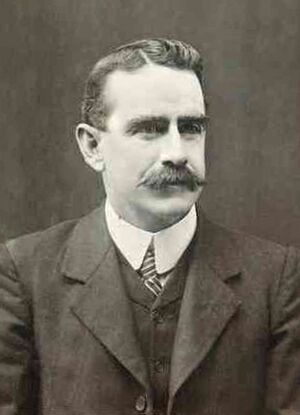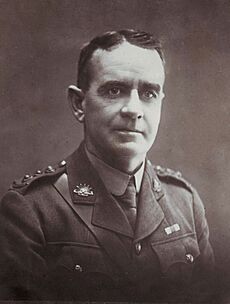Bill Denny facts for kids
Quick facts for kids
Bill Denny
|
|
|---|---|

Denny in c. 1910
|
|
| 29th Attorney-General of South Australia | |
| In office 17 April 1930 – 18 April 1933 |
|
| Premier |
|
| Preceded by | Hermann Homburg |
| Succeeded by | Shirley Jeffries |
| In office 16 April 1924 – 8 April 1927 |
|
| Premier | John Gunn |
| Preceded by | Hermann Homburg |
| Succeeded by | Hermann Homburg |
| In office 3 June 1910 – 17 February 1912 |
|
| Premier | John Verran |
| Preceded by | Hermann Homburg |
| Succeeded by | Hermann Homburg |
| Member of the South Australian House of Assembly for Adelaide | |
| In office 3 November 1906 – 7 April 1933 |
|
| In office 3 May 1902 – 26 May 1905 |
|
| Member of the South Australian House of Assembly for West Adelaide | |
| In office 17 March 1900 – 2 May 1902 |
|
| Personal details | |
| Born |
William Joseph Denny
6 December 1872 Adelaide, South Australia |
| Died | 2 May 1946 (aged 73) Norwood, South Australia |
| Resting place | West Terrace Cemetery, Adelaide |
| Political party |
|
| Spouse |
Winefride Mary Leahy
(m. 1920) |
| Alma mater |
|
| Profession |
|
| Military service | |
| Branch/service | Australian Army |
| Years of service | 1915–1919 |
| Rank | Captain |
| Unit |
|
| Battles/wars | World War I (Western Front) |
| Awards | Military Cross |
William Joseph Denny (6 December 1872 – 2 May 1946) was an important Australian figure. He was a journalist, a lawyer, a politician, and a brave soldier. He served in the South Australian House of Assembly for many years. Bill Denny worked hard to help people, especially by making it easier for families to buy homes. He also fought in World War I and was recognized for his courage with the Military Cross.
Contents
Early Life and First Steps in Politics
William Joseph Denny was born in Adelaide, South Australia, on 6 December 1872. He was one of three children. He went to Christian Brothers College, Adelaide. Later, he worked as a weather clerk.
In his early twenties, Bill Denny was active in debating clubs. He also became the editor of The Southern Cross newspaper. This paper shared news for the Catholic community in South Australia. In 1898, he became a councillor for the Adelaide City Council.
Denny first tried to become a politician in 1899 but was not elected. However, in 1900, he won a special election for the seat of West Adelaide. He ran as an "independent liberal." He was re-elected in 1902 for the new Adelaide area. After losing in 1905, he was elected again in 1906 as a member of the United Labor Party. He kept his seat until 1933. While in politics, he also studied law at the University of Adelaide and became a solicitor in 1908.
Helping South Australia as Attorney-General
On 3 June 1910, Bill Denny became the Attorney-General of South Australia. This is like the chief legal advisor for the government. He also looked after the Northern Territory for a short time.
During his time as Attorney-General, Denny helped create important new laws. One was the Advances for Homes Act 1910. This law made it easier for workers to borrow money to buy homes. It helped them avoid high rents and poor living conditions. He also supported the Female Law Practitioners Act 1911. This law was very important because it allowed women to practice law in South Australia for the first time ever.
Denny was known for being tall and having long legs. This made him a favorite subject for cartoonists!
A Soldier in World War I
In August 1915, at 43 years old, Bill Denny joined the First Australian Imperial Force (AIF) to fight in World War I. He started as a regular soldier. Later, he became an officer.
He served in Egypt and then in France on the Western Front. He was promoted to lieutenant in 1916. In September 1917, he showed great bravery. He was leading a group carrying water when they were attacked by heavy artillery. Even though he was wounded, he helped his injured men and made sure the water reached its destination. For his courage, he was awarded the Military Cross.
He received his award from King George V in England. After recovering, he worked at the AIF Headquarters in London. He was promoted to captain in 1918. He left the army in 1919 and wrote a book about his war experiences called The Diggers.
Back to Politics and Helping People
Even while serving overseas, Bill Denny was re-elected to Parliament in 1918. He returned to Australia in 1919. In 1920, he married Winefride Mary Leahy.
He was appointed Attorney-General again in April 1924. He also became the Minister for Housing and Minister for Repatriation. Repatriation meant helping soldiers who had returned from the war.
As Minister for Housing, Denny was a big part of the Thousand Homes Scheme. This plan aimed to build affordable homes for families. It especially helped soldiers returning from the war and people with lower incomes. The land for these homes was even where Denny had trained before going to war.
Denny also helped change how elections were run. He made sure that judges were in charge of elections. This helped make the system fairer and more controlled by the state.
As a returned soldier, Denny was often asked to speak at events. He unveiled memorials for soldiers. In 1931, he even unveiled the National War Memorial in Adelaide. He was acting as Premier at the time.
In 1931, Denny and other government leaders were removed from the Labor Party. This happened because they supported a plan to help the economy during tough times. They formed a new group called the Parliamentary Labor Party. Denny lost his seat in the 1933 election.
Later Life and Legacy
Bill Denny continued to practice law after leaving politics. He wrote another book about his life and war experiences called A Digger at Home and Abroad in 1941.
He died on 2 May 1946, at the age of 73. He had a state funeral, which is a special public funeral given to important people. He was buried at West Terrace Cemetery.
Denny loved sports. He was a steward at the Adelaide Racing Club and was a patron of the West Adelaide Football Club for many years. He also enjoyed diving for crayfish. People remembered him for his honesty, his many skills, and his wide knowledge. He was very proud of the laws he helped create that made life better for everyday people.
Images for kids


